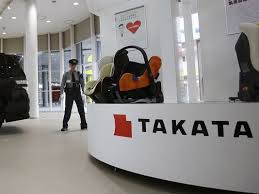Injury Risk May Expand Takata Airbag Recall
September 29, 2015
As our Texas airbag personal injury lawyers have detailed, Takata Corporation’s airbag recall is the largest recall in the history of the United States. Now, it looks like the recall is about to get even larger.
Expanded Recall Would Cover 7 New Truck And Car Manufacturers
The National Highway Transportation Safety Agency or “NHTSA” has already instigated the recall of dangerous Takata airbags installed in cars, trucks, and SUVs manufactured by 12 manufacturers. These “safety” devices have resulted in numerous serious injuries and deaths around the country.
The federal safety agency is now considering adding 7 more carmakers to the recall:
- Jaguar Land Rover
- Mercedes-Benz
- Spartan Motors
- Suzuki
- Tesla
- Volvo Trucks
- VW Group
NHSTA has asked these manufacturers to disclose all vehicles with Takata-supplied airbag inflators that contain the deadly ammonium nitrate propellant.
Text Of New Government Letter To Additional Carmakers
The new government inquiries contain slight differences, but in substance all the letters are consistent with the following letter to Mercedes Benz US, LLC, which was sent on September 22, 2015:
“As you may already be aware, the National Highway Traffic Safety Administration (“NHTSA”) has opened a formal defect investigation into certain air bag inflators manufactured by TK Holdings, Inc. (“Takata”) that may become over pressurized and/or rupture during air bag deployment, and that may cause injury to the driver and/or passenger. This investigation has been designated as Engineering Analysis, EA15-001 (formerly, Preliminary Evaluation PE14-016). During the pendency of this investigation, Takata submitted four Defect Information Reports to NHTSA in accordance with 49 C.F.R. § 573.6 (the “Takata DIRs”). The Takata DIRs identify a defect related to motor vehicle safety that may arise in some of the frontal air bag inflator types manufactured by Takata, including PSDI, PSDI-4, PSDI-4K, SPI, PSPI, and PSPIL, that were supplied to certain vehicle manufacturers for use in certain models and model years. The vehicle manufacturers identified in the Takata DIRs have either filed corresponding Defect Information Reports or have filed letters confirming that the affected vehicles are already covered by previously announced recalls.
As part of NHTSA’s ongoing investigation of defective Takata air bag inflators and the agency’s continued oversight of the associated remedies, NHTSA has opened a Coordinated Remedy Program proceeding to facilitate and ensure, industry-wide, the full, adequate, and appropriate remedy of affected vehicles. See Notice of Coordinated Remedy Program Proceeding/or the Replacement of Certain Takata Air Bag lnflators, 80 FED. REG. 32,197 (June 5, 2015). The agency believes this unprecedented step is necessary because the risk of harm presented by the defective Takata air bag inflators transcends the scope of the usual Safety Act recall requirements. Further, remedy programs that are individual to each of the affected vehicle manufacturers have created a patch-work solution that NHTSA believes may not adequately address the safety risks presented by the defective inflators within a reasonable time.
Through the Coordinated Remedy Program proceeding, NHTSA seeks to promote a full, open, and collaborative process (without compromising NHTSA’s objectives of safety) that facilitates thoughtful problem-solving and engages the affected vehicle manufacturers, Takata, and other Tier One Suppliers in developing and implementing solutions to this significant safety risk. This process is intended to produce solutions for the prioritization, organization, and phasing of remedy programs, and to appropriately address the multitude of factors contributing to the complexity of these recall programs. These factors include, but are not limited to, environmental factors (including air bag inflator age), vehicle design factors, sourcing and production of replacement parts given the volume of parts required, urgency of timely vehicle remedies, allocation, delivery, installation, owner notification, and adequacy of the remedy (including the adequacy of the current scope of the recall programs and subsequent replacement of certain initial replacement inflators ).
As stated in the Takata DIRs, Takata’s current theory as to the root cause of this defect is that the propellant wafer in some inflators may experience an alteration over time, which could potentially lead to overaggressive combustion or potentially cause the inflator to rupture. Takata is continuing its testing efforts to better understand the scope of the problem and the affected vehicle population. However, given the current understanding of the role that time, temperature, and absolute humidity play in the defect mechanism, it is expected that the scope of the current Takata recalls may expand as time goes on and will likely grow to include vehicles that are outside the scope of the current recalls. The recalls may also grow to include inflator types that are not currently within the scope of the Takata DIRs.
Takata has identified your company as having been supplied air bag inflators that contain either its 2004 or 2004L ammonium nitrate-based propellant and that are not currently covered by the Takata DIRs. In connection with the Coordinated Remedy Program proceeding, NHTSA is considering not only whether to issue an administrative order that would coordinate the remedy programs associated with the current Takata recalls, but also whether such an order should include expansion of the current recalls. In order for the agency to fully evaluate this possibility, NHTSA requests that you answer the attached questions truthfully and completely, in the form of comments to Docket No. NHTSA-2015-0055. To be most helpful, NHTSA asks that you submit your responses within 21 days following receipt of this letter.
[Closing omitted]Manufacturers Already Subject To Recall
The following vehicle manufacturers are already subject to the Takata airbag recall because their airbags have the known potential to cause serious personal injuries and death:
- American Honda Motor Company
- BMW of North America
- Chrysler Group, LLC
- Daimler Trucks North America, LLC
- Daimler Vans USA LLC
- Ford Motor Company
- General Motors, LLC
- Mazda North American Operations
- Mitsubishi Motors North America, Inc.
- Nissan North America, Inc.
- Subaru of America, Inc.
- Toyota Motor Engineering and Manufacturing
Our Houston Personal Injury Lawyers Assist Defective Airbag Victims Nationwide
Morrow & Sheppard handle cases involving serious bodily injury and death caused by defective airbags nationwide.
If you or a loved one has been seriously injured in an accident involving an airbag, or if a loved one has been killed, please contact us now for a free and confidential consultation to discuss your options.
There is no charge for the consultation, and if you end up hiring us, we only get paid if you win.
We can be reached nationwide at 1-800-489-2216 or locally in Houston at 713-489-1206.
You can also reach us by filling out the online case evaluation form above.
- Home
- |
- Products Liability
- |
- Injury Risk May Expand Takata...
















































